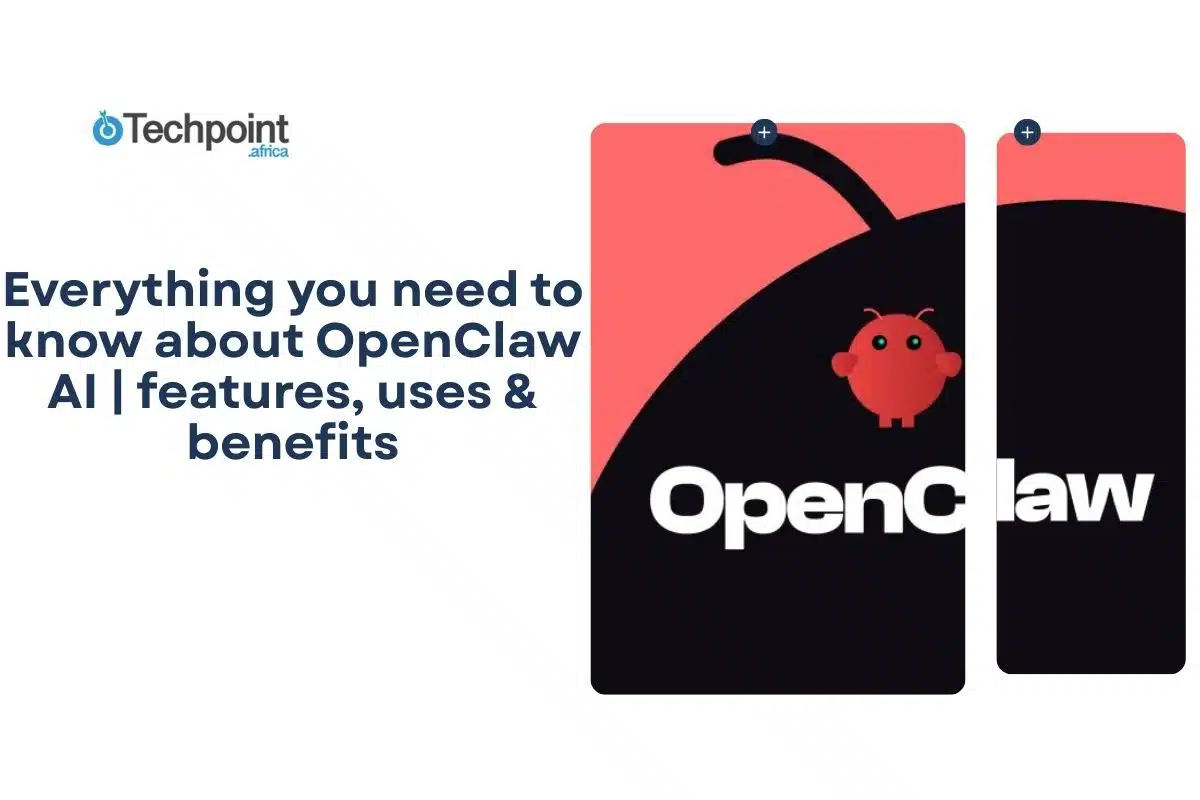I’ve used AnswerThePublic for a while, back when it was the shiny new toy every content strategist was raving about. I loved the visual keyword maps, the curiosity-fueled queries, and how quickly it helped me go from idea drought to topic waterfall.
But lately, a lot of things have changed. The free plan feels like a tease. Although it’s still decent, the tool itself hasn’t evolved much, despite significant changes in SEO needs. Marketers everywhere are looking elsewhere. So, I did what any slightly jaded but still hopeful SEO writer would do: I tested alternatives.
Not by reading landing pages or watching explainer videos. I used these tools. Six of them, each with a slightly different take on keyword discovery.
In this piece, I’ll break down the results. You’ll see the strengths, the quirks, and the tradeoffs. And yes, I’ll tell you which one I’m keeping in my stack (and which one had me rage-clicking the close tab button).
TLDR: Key takeaways from this article
- Google Keyword Planner remains a solid, no-fluff starting point, especially for PPC pros or those who want raw data straight from the source.
- Ahrefs shines when you need comprehensive SEO research and keyword depth, which is great if you’re scaling or auditing.
- AlsoAsked is perfect for visual thinkers who map out content from branching user questions.
- Moz Keyword Explorer is ideal for simplified research with solid SERP and intent indicators. It’s great for beginners or content-first marketers.
- Semrush Keyword Magic Tool is your go-to for robust data, competition metrics, and serious keyword depth.
- Ubersuggest balances affordability with solid Google keyword suggestions, though the UI has its quirks.
AnswerThePublic overview
Before we dive into the alternatives, let’s talk about the tool that started it all: AnswerThePublic.
I’ve leaned on this tool for years to surface those oddly specific questions people type into Google. The visual keyword wheels were both beautiful and useful, especially when I was in early brainstorming mode.
Here’s a quick snapshot of what AnswerThePublic currently offers:
What AnswerThePublic does
| Feature | Description |
| Keyword question mining | Visualizes auto-suggested search queries in “why,” “how,” and “what” formats |
| Data source | Pulls from Google’s autocomplete and search suggestions |
| Visual mapping | Generates keyword wheels for question-based content ideation |
| Tagging system | Allows keyword tagging and organization |
| CPC + search volume (paid) | Adds basic commercial intent and traffic estimates |
| Export options | CSV and basic image downloads |
Pricing
Individual ($5/month or $50 for a lifetime)
Includes 1 user, 100 searches per day, CPC and search volume data, and the ability to organize results with Tags. Ideal for entrepreneurs, consultants, and small businesses who need quick data for strategy and reporting.
Pro ($49/month or $490 for a lifetime)
Supports up to 3 users with unlimited searches per day, and includes CPC and search volume data and result tagging. Best for teams managing multiple business queries and merging insights into strategy.
Expert ($99/month or $990 for a lifetime)
Unlimited users and unlimited daily searches. All features included: CPC and volume data, tag organization, and trend tracking. Built for teams focused on brand monitoring or content planning.
Note: You can cancel your plans anytime; the first 7 days are free.
How I picked the 6 best AnswerThePublic alternatives
Here’s what I paid attention to for each tool:
1. UI and ease of use
If I needed a tutorial just to find the “search” button, it was a red flag. I looked for clean interfaces, intuitive layouts, and minimal friction between idea and output.
2. Data sources
Some tools pull straight from Google Autosuggest, while others add sources like Reddit, YouTube, Bing, or even forums. The more transparent and diverse the data, the better. Bonus if they layered search intent or trend velocity into the mix.
3. Keyword clustering and export options
Grouping similar terms is a game-changer for content planning. Bonus points if I could export the data easily into CSV or a shareable doc format.
4. Free vs paid features
I tested what you could do on a free plan, not just what they promise in the upgrade. Some tools are surprisingly generous, others lock all the good stuff behind a paywall.
5. Bonus tools
If the tool offered anything extra that helped me go from “keyword idea” to “publishable content,” I noted it.
The 6 best AnswerThePublic alternatives I tested
The following are six solid alternatives to AnswerThePublic. Each comes with its strengths and drawbacks.
1. Google Keyword Planner — best free keyword research tool
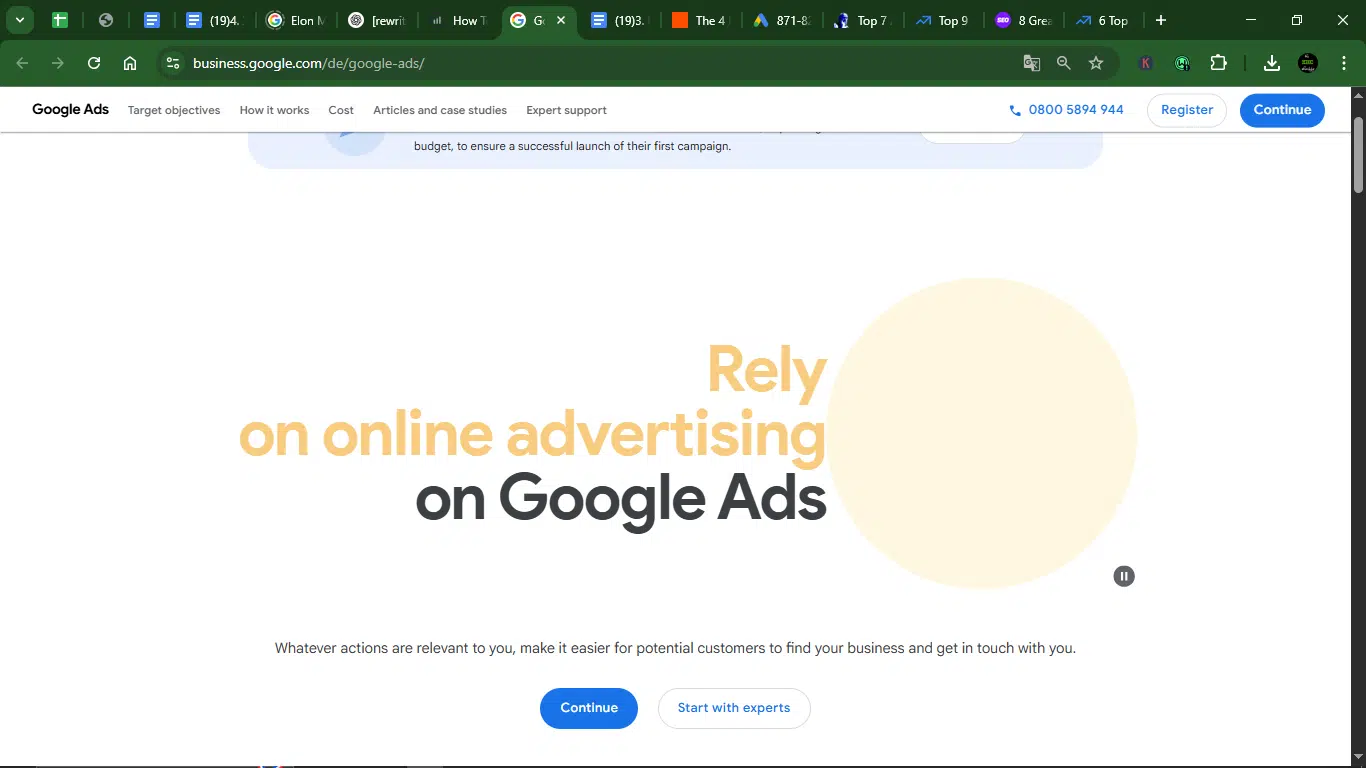
Google Keyword Planner (GKP) is the OG of keyword tools. No run around, just solid data straight from the source. Originally built for Google Ads campaigns, it’s since become a go-to for SEOs and bloggers like me who want to brainstorm content topics using real search volume and trend data.
If you’ve ever wanted to know how many people search “AI in healthcare” in Lagos versus London, this is your tool. It won’t write headlines for you or build keyword clusters, but for raw intent signals and location targeting, it’s still gold.
| Developer | |
| Year launched | 2013 |
| Type of SEO tool | Keyword research & PPC planning |
| Top 3 use cases | Keyword idea generation, search volume insights, and local SEO targeting |
| Who can use it | SEOs, advertisers, bloggers, and local businesses |
| AI capabilities | None |
| Starting price | Free with a Google Ads account |
| Free plan or trial? | Yes, free forever |
How Google Keyword Planner works
Google Keyword Planner is free, but you need a Google Ad account. Because of this, many people think they need to spend on ads to access this tool, but that’s not exactly true. This has made “how to use Google Keyword Planner for free” one of the most common queries on Google.
Here’s how this free tool works:
1. Sign in to Google Ads. Visit the Google Ads website and use your Google account to log in or create a new one if you don’t have one.
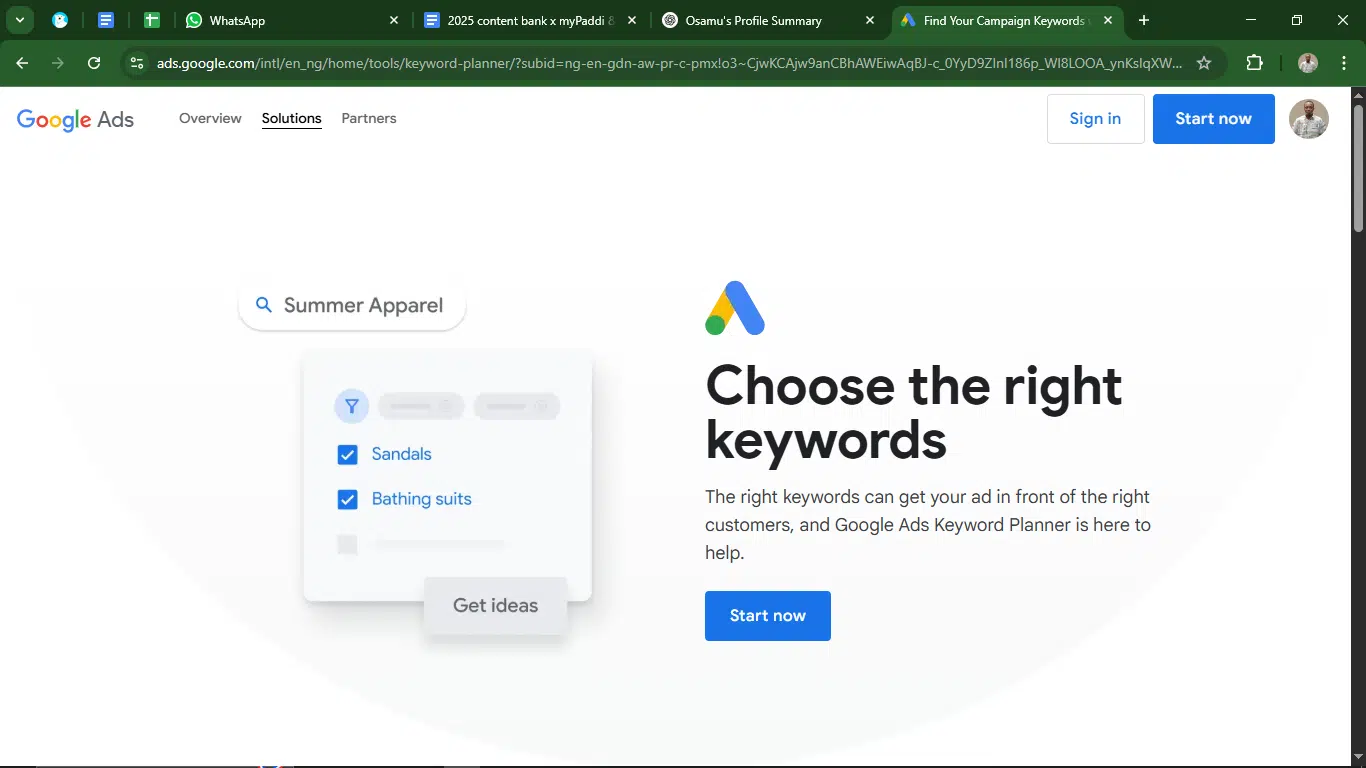
2. Skip campaign setup: Bypass the prompt to create an ad campaign by skipping campaign creation. This should move you directly to Google Keyword Planner, without creating an ad campaign.
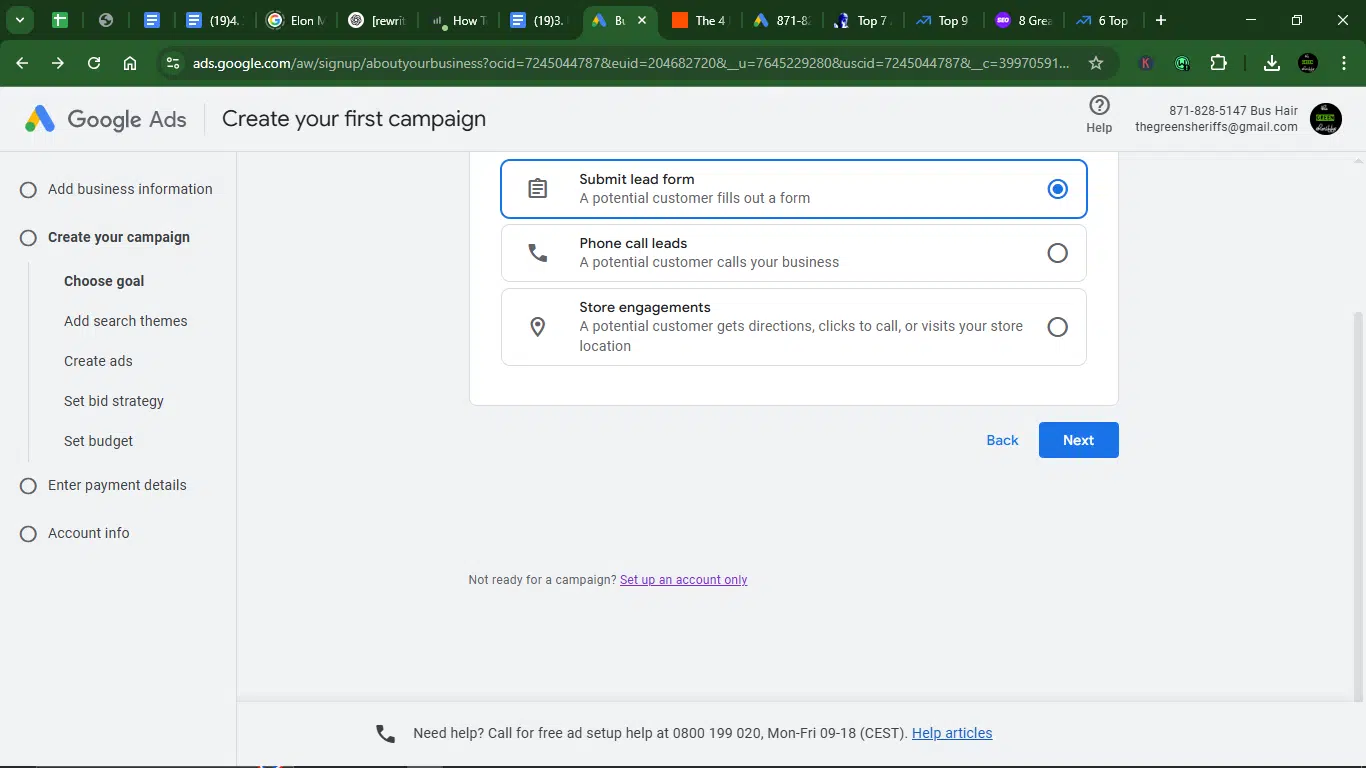
3. Navigate to Keyword Planner. Once you’re in, go to “Tools and Settings” (it should be at the top right corner) and click it. Under “Planning,” you’ll see “Keyword Planner.”
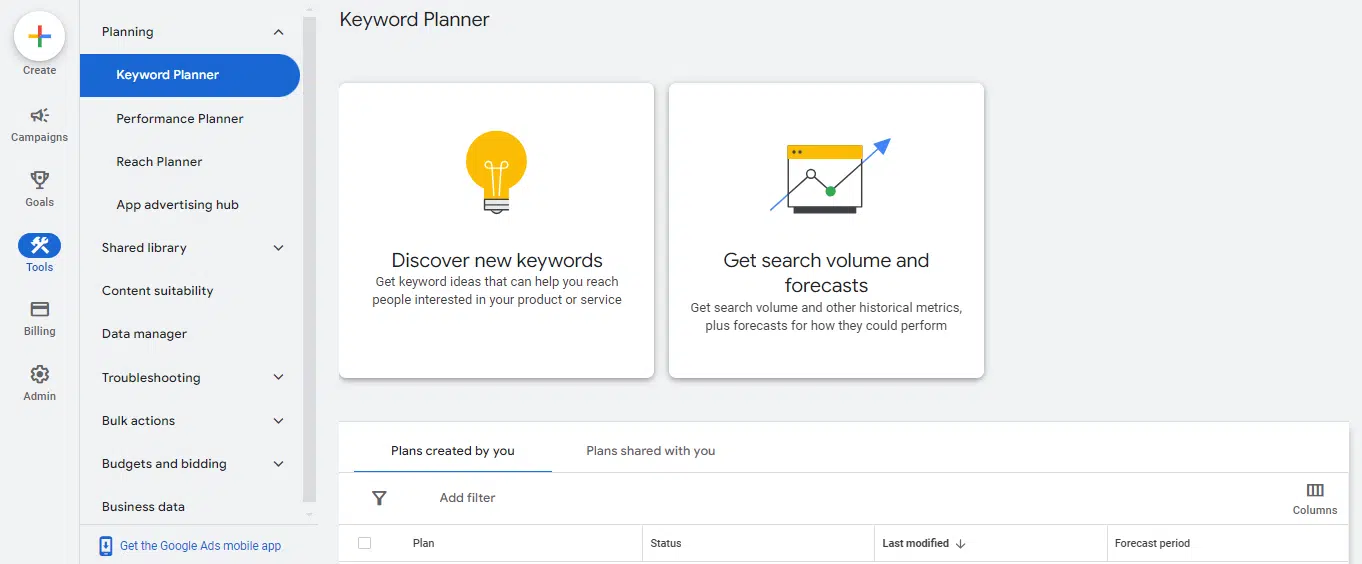
4. Choose your research path: Pick between “Discover new keywords” or “Get search volume and forecasts.”
5. Enter seed keywords or URL. Enter a keyword like “AI in healthcare” or your website URL.
6. Refine and export. Use filters (location, language, search network) and export results in CSV or Excel for further use.
Key features:
- Keyword research: Enter a keyword or URL to get suggestions based on real user searches.
- Search volume data: View monthly averages, ranges, and historical trends for specific keywords. Use the search trends and fluctuations to determine keyword popularity over time.
- Competition analysis: See how competitive each keyword is among advertisers (for PPC, not SEO difficulty). It helps you gauge the difficulty of ranking for specific keywords in organic search results.
- Geotargeting: Narrow research down by location or language. This is great for local SEO.
- CSV export: Export keyword lists for content briefs, client decks, or SEO tools.
- Google-verified accuracy: One of the few tools giving keyword data straight from the source.
- Forecasting: Helpful if you run ads, and it includes bid estimates and traffic forecasts.
Pricing:
It’s completely free to use as long as you have a Google Ads account. You don’t have to run ads. Just create an account, skip campaign setup, and dive in.
What I liked about Google Keyword Planner:
- It gives you real data from Google. No guesswork, no third-party modeling.
- Keyword volume by region is super helpful for local content and geo-specific strategy.
- Still one of the most accurate tools for checking actual monthly search numbers.
- Free forever, even if you never spend a dollar on ads.
- Forecasting features are surprisingly useful for estimating PPC budgets or seasonal trends.
- You can analyze your site for keyword ideas, which is great if you’re optimizing old content.
What I didn’t like about Google Keyword Planner:
- The interface can feel like you’ve time-traveled to 2010. It’s functional, not fun.
- No keyword clustering, SERP previews, or intent tagging; just keywords and stats.
- Unless you’re running ads, keyword volume shows up in vague ranges (e.g., “1k–10k”).
- Doesn’t show People Also Ask.
- Not the best for finding new long-tail inspiration. It’s more about verifying, not discovering.
2. Ahrefs Keywords Explorer — best for deep SEO keyword & competitor analysis
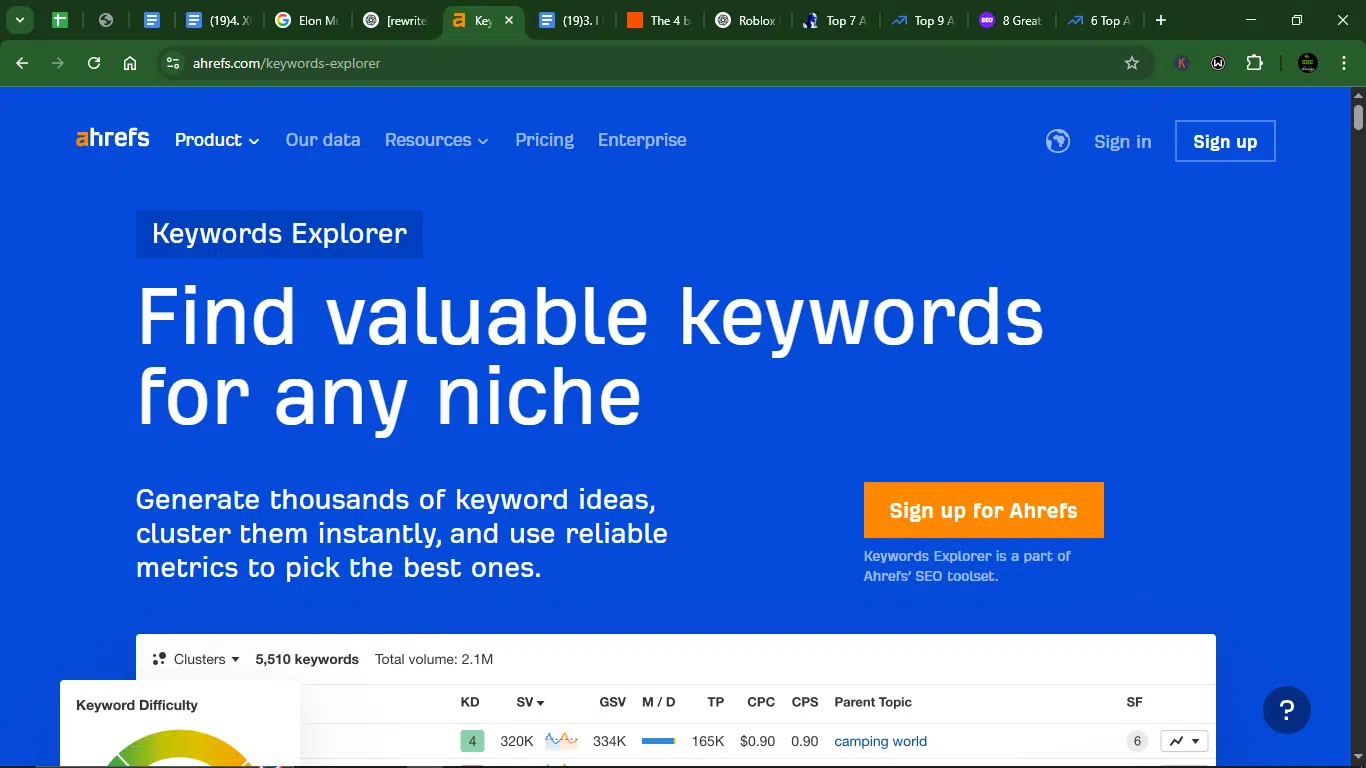
Ahrefs Keywords Explorer is the muscle car of keyword research. It’s sleek, powerful, and built for serious SEOs. While it’s part of Ahrefs’ broader SEO suite (famous for backlink tracking and audits), this particular tool shines for its data depth: search volume, keyword difficulty, click potential, SERP features, and even traffic distribution by country.
It’s ideal for users who want to go beyond keywords and understand the full competitive and content landscape. Not the cheapest, but pound-for-pound, one of the most insightful tools on the market.
| Developer | Ahrefs |
| Year launched | 2015 |
| Type of SEO tool | Keyword research & competitive analysis |
| Top 3 use cases | Keyword discovery, competitor keyword analysis, and content gap research |
| Who can use it | SEOs, content marketers, agencies, bloggers |
| AI capabilities | Limited AI for keyword suggestions |
| Starting price | $29/month (Starter plan) |
| Free plan or trial? | Free Webmaster Tools with limited access |
How Ahrefs Keywords Explorer works:
- Find thousands of keyword ideas in seconds. Use AI to generate and cluster keyword ideas instantly, pull from six reports to discover real search queries users are typing, and group keywords by Parent Topic or common terms—no more sorting through duplicates.
- Analyze keywords with real data. Estimate how hard it is to rank for any keyword. See search volume trends and country-specific breakdowns. Understand each topic’s true traffic potential, not just monthly search volume. Review current SERPs to gauge competition.
- Target smarter with AI-powered insights. Uncover low-hanging fruit and underused opportunities. Detect search intent automatically. Compare SERPs side by side. Build and organize keyword lists for campaigns or content planning. Cross-check against keywords you already rank for to fill gaps.
Key features:
- Massive keyword database: 28.7 billion keywords globally and 2.3 billion in the US alone. This is great for niche and global research.
- Keyword difficulty (KD): Shows how hard it is to rank based on the backlink strength of the current top pages.
- Search volume and click metrics: Go beyond volume (based on 12-month average search volume forecasts) and see how many actual clicks each keyword generates.
- Keyword clustering: Group similar keywords using parent topics or AI-generated terms.
- SERP analysis: See who’s ranking, why they’re ranking, and how you can beat them.
- Content gap analysis: Identify what your competitors rank for that you don’t.
- Export and integration: Save keyword lists, export as CSV, and integrate with Ahrefs Rank Tracker or Site Explorer.
- Multi-engine support: Get data from Google, YouTube, Bing, Amazon, Baidu, etc.
- Site audit: Crawl your website and get an SEO health score to spot and fix any technical SEO issues.
- Rank tracker: allows you to keep tabs on your business or website’s keyword rankings over time across 190 countries.
Pricing:
The free Ahrefs Webmaster Tools (AWT) offers limited free access to Site Audit and Site Explorer for verified sites only, not the full Keywords Explorer.
| Plan | Target users | Monthly price | Annual price | Key features |
| Starter | Individuals just starting out | $29 | Site ExplorerKeyword ExplorerSite Audit | |
| Lite | Small businesses, solopreneurs, and personal projects | $108 | $1,290 | 5 projects 6 months of historical data750 tracked keywords100,000 crawl credits500 credits per user Core tools: Dashboard, Site Explorer, Keywords Explorer, Brand Radar, Site Audit, Rank Tracker, Competitive Analysis, SERP history, Page Inspect, Web Analytics |
| Standard | Freelance SEOs and marketing consultants | $208 | $2,490 | Everything in Lite, plus portfolios, Content Explorer, Batch Analysis, SERP comparison20 projects2 years of historical data2,000 tracked keywords 500,000 crawl creditsUnlimited credits per user |
| Advanced | Lean in-house marketing teams | $374 | $4,490 | Everything in Standard, plus Web Explorer, Looker Studio integration, search type distribution, and agency directory listing50 projects5 years of historical data5,000 tracked keywords1.5 million crawl creditsUnlimited credits per user |
| Enterprise | Large agencies and enterprise-level teams | $1,499 | Custom | Everything in Advanced, with custom features- Advanced automation, controls & reportingTalk to sales for the full feature list and onboarding helpAnnual commitment required |
What I liked about Ahrefs Keywords Explorer:
- Data quality is top-tier: accurate, fresh, and globally detailed.
- The keyword difficulty metric is extremely helpful for prioritizing targets.
- SERP overview gives full visibility into why certain pages rank.
- Includes click potential and return rate, both of which are underrated metrics.
- Great for content gap analysis and competitor insights.
- The interface is modern, fast, and intuitive once you get the hang of it.
What I didn’t like about Ahrefs Keywords Explorer:
- It’s super pricey. A big investment if you’re not an agency or power user.
- No permanent free plan; just a trial and limited free tools.
- It can be overwhelming if you just need a few keyword ideas.
- AI-powered features (like clustering and intent detection) are useful but not cutting-edge.
- Some data (e.g., KD) is updated slowly, not always in real-time.
3. AlsoAsked — Best for question research
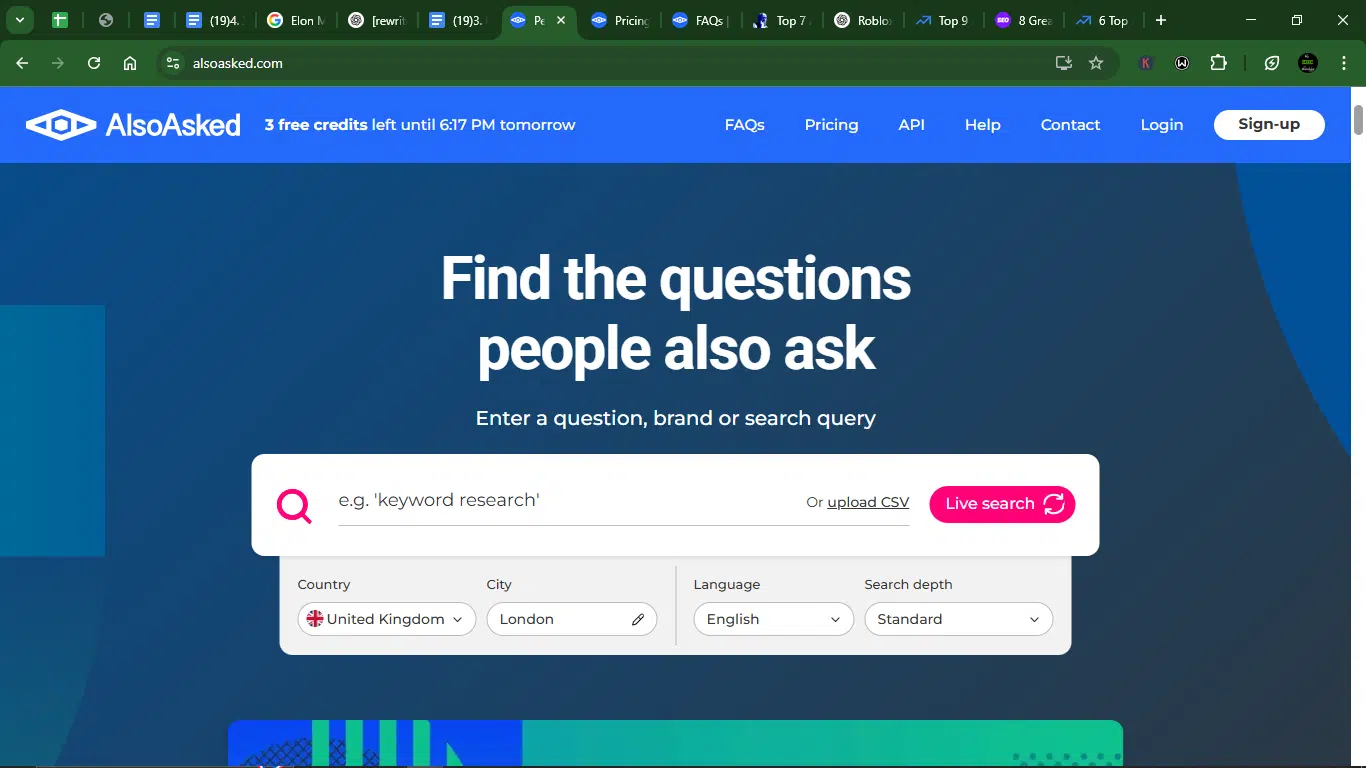
If AnswerThePublic had a smarter, more focused sibling who finished what they started, it would be AlsoAsked. This tool is laser-focused on extracting Google’s “People Also Ask” data and organizing it into tidy, branching diagrams that show how questions connect, from broad to niche.
It’s the ideal tool when you’re planning content that answers user intent and builds FAQ-rich, semantically aligned pages. Think content briefs, featured snippet hunting, or clustering ideas for topical authority, but visually.
| Developer | AlsoAsked Ltd. |
| Year launched | 2019 |
| Type of SEO tool | Search listening & question clustering |
| Top 3 use cases | Topic ideation, content planning, and user intent mapping |
| Who can use it | Bloggers, SEOs, content strategists, agencies |
| AI capabilities | No built-in AI, but structured query expansion is algorithmically smart |
| Starting price | $12/month (Basic plan) |
| Free plan or trial? | Free tier (limited searches) |
How AlsoAsked works:
- Enter a keyword (e.g, “email marketing tools”) and select region and language so the results match your audience.
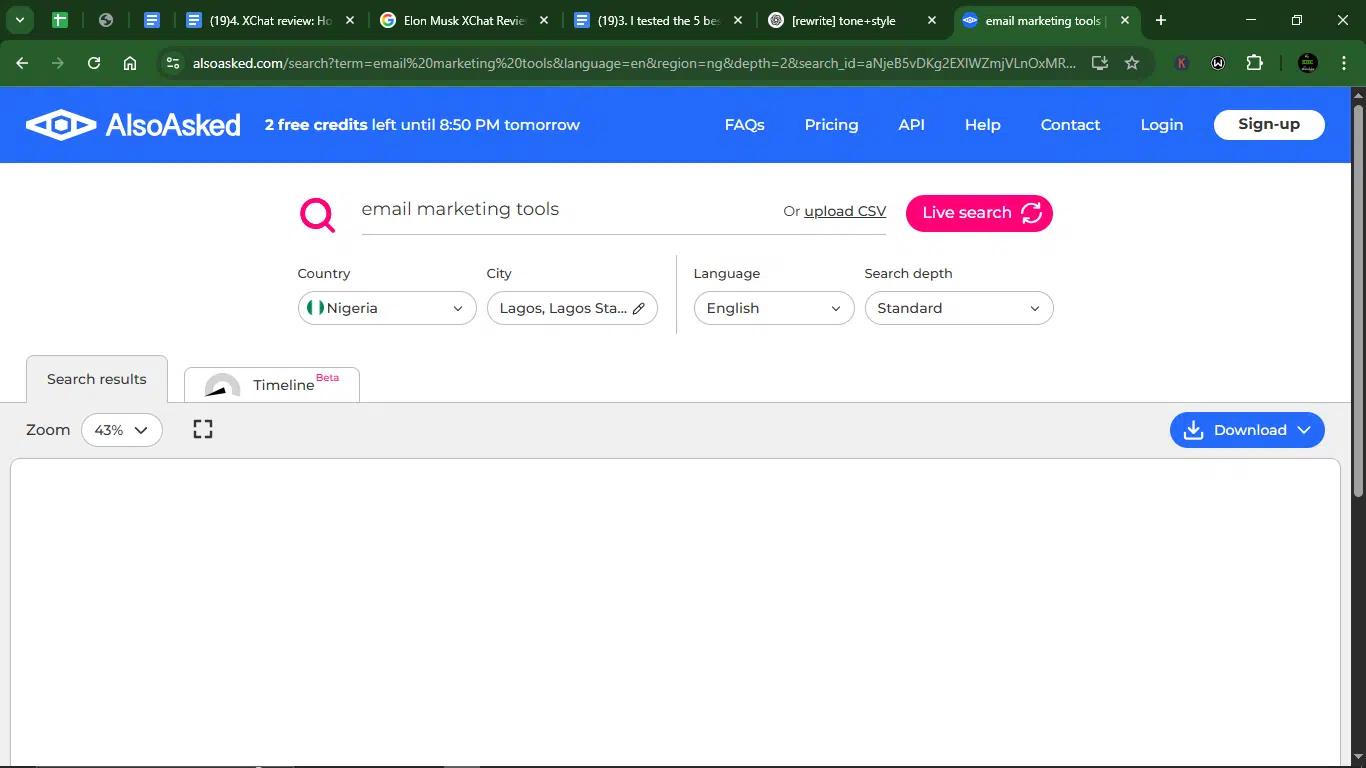
- AlsoAsked scrapes real-time PAA questions from Google, then builds a branching map of related queries.
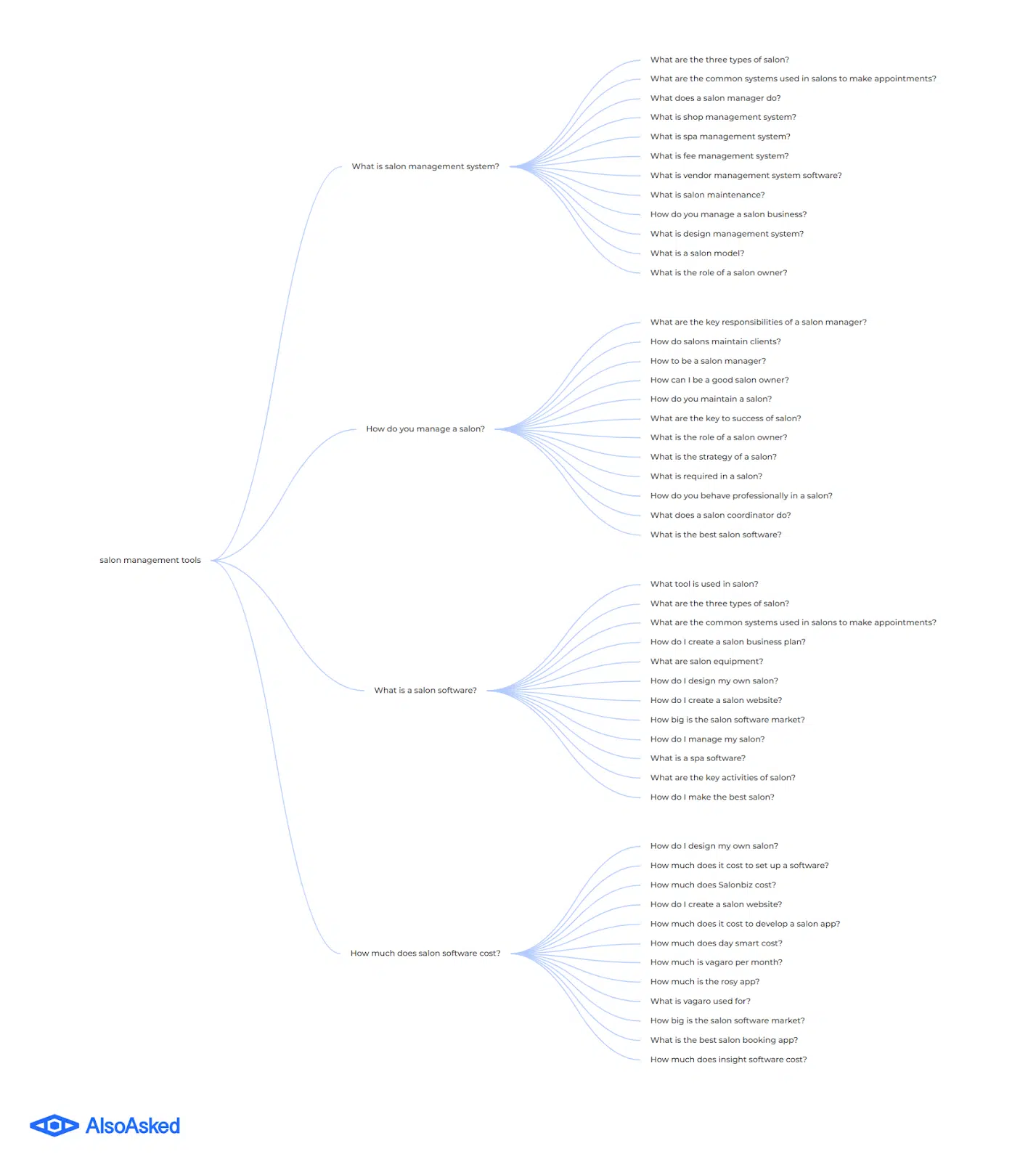
- The tool then maps out related questions in a tree format that shows how queries are nested or evolve.
- You can download the tree as an image (PNG) or data (CSV) for outlining, pitching, or presentation.
Key features:
- Real-time Google PAA data: Direct from the source, so it’s current and accurate.
- Mind map format: Visually displays how questions evolve from one another.
- Export options: Save results as PNGs (great for decks) or CSVs (for workflows). The result can include the question set, the answer snippet Google provides, the URL of the ranking page, the page title of the ranking page, and encoded relationship data.
- Regional and language targeting: Tailor to your audience’s context to stay relevant.
- Deep & Bulk Search: Return about 150 questions per search, or upload up to 1,000 queries via CSV, and get a zip download containing all of the data from a CSV export.
- API Access (Pro plan): Integrate PAA data into SEO tools, ChatGPT, Screaming Frog, etc.
- Programmatic SEO support: Automate content audits and topical clustering at scale.
Pricing:
It has limited searches, which is good for testing but not suitable for ongoing workflows.
| Plan | Monthly cost | Annual cost | Target users | Key features |
| Basic | $12 + tax | $144 | Beginners or casual users | 100 credits per month Unlimited users All regions & languages PNG image export24-hour search history |
| Lite | $23 + tax | $276 | Regular users who need more history & export tools | 300 credits per month Unlimited usersAll regions & languagesPNG image export1-month search history Deep searchCSV data exportHistoric Timeline |
| Pro | $47 + tax | $564 | Power users, agencies, and data-driven SEOs | 1,000 credits per monthUnlimited users All regions & languagesPNG image export1 year search historyDeep searchCSV data exportHistoric TimelineBulk searchesAPI accessUnlimited PAYG credits |
What I liked about AlsoAsked:
- The visual mind map format is surprisingly powerful for content ideation.
- Pulls data directly from Google, which means it’s aligned with actual search behavior.
- Incredibly useful for FAQ sections, People Also Ask optimization, and topical authority.
- Very intuitive; minimal learning curve, clean interface.
- Bulk mode is excellent for power users.
- Works seamlessly for global content planning (regional/language targeting).
What I didn’t like about AlsoAsked:
- No keyword metrics like search volume or competition.
- It’s only a question tool; it can’t replace full SEO suites like Ahrefs.
- Limited AI or automation unless you go Pro and build with the API
- The free plan is quite restrictive.
- It can occasionally be slow or glitchy with larger bulk jobs.
- Doesn’t auto-sync with content tools unless manually integrated.
4. Moz Keyword Explorer
Moz Keyword Explorer may not be the flashiest, but it always drops solid advice. Created by Moz (a forerunner in the SEO space), this tool goes deeper than just search volume. It brings in Keyword Difficulty, Organic CTR, and its signature “Priority” score, which mashes together potential, traffic, and competition into one tidy metric.
If you’re someone who wants reliable keyword data, a clean interface, and the ability to sanity-check your ideas with SERP previews before diving in, this tool is a steady ally. It’s especially good when you want to know what’s winnable, not just popular.
| Developer | Moz, Inc. |
| Year launched | 2016 (Explorer); Moz was founded in 2004 |
| Type of SEO tool | Keyword research & difficulty analysis |
| Top 3 use cases | SERP analysis, topic opportunity scoring, and rank targeting |
| Who can use it | SEOs, content marketers, and small businesses |
| AI capabilities | No native AI, but integrates well into AI workflows |
| Starting price | $49/month (Starter plan) |
| Free plan or trial? | 10 free queries per month with signup |
How Moz Keyword Explorer works:
Pop in a keyword (e.g., “AI in marketing”), select your target location region, and hit “Find keywords.”
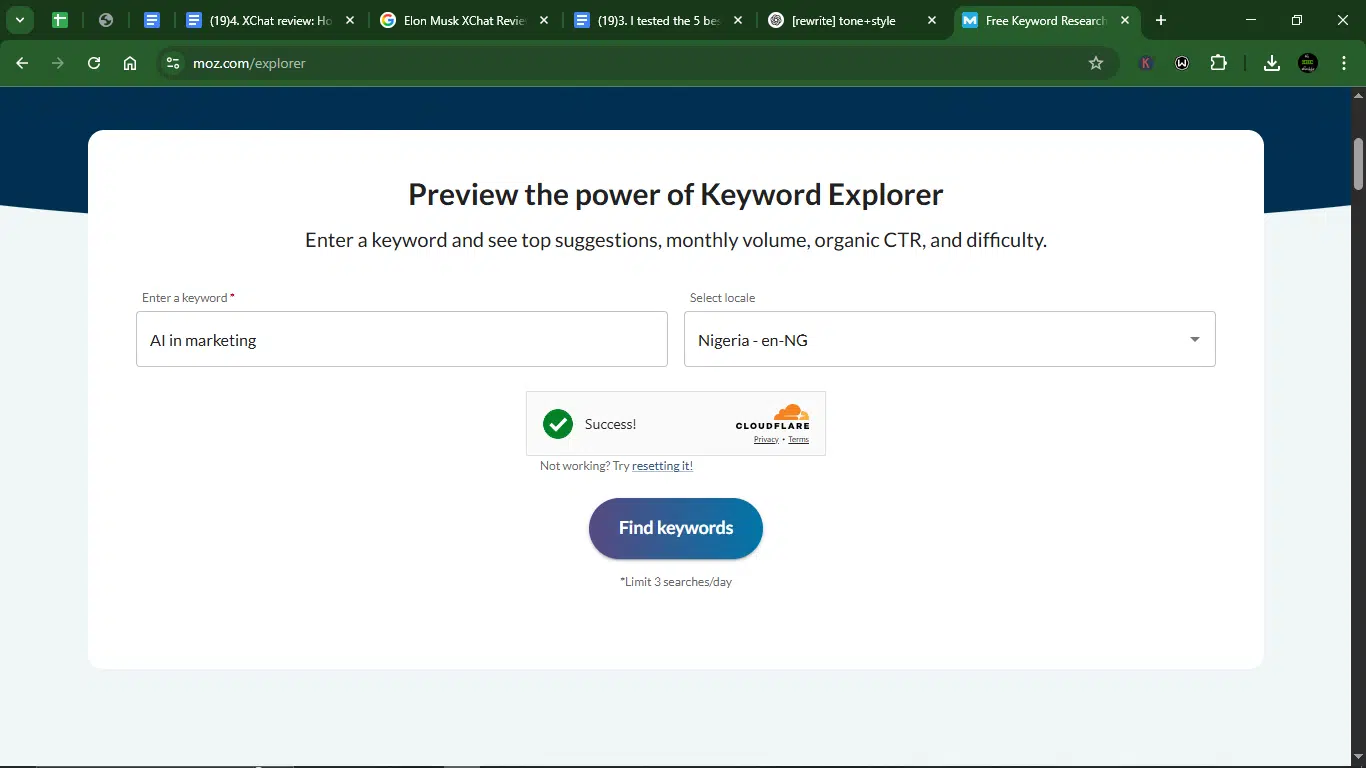
Moz then returns:
- Monthly search volume.
- Keyword difficulty.
- Organic click-through rate estimates.
- Top keyword suggestions.
- A Priority score that blends volume, difficulty, and opportunity
- A SERP snapshot to show what you’re up against. You can add keywords to lists, export your research, or track rankings across time via the broader Moz Pro dashboard.
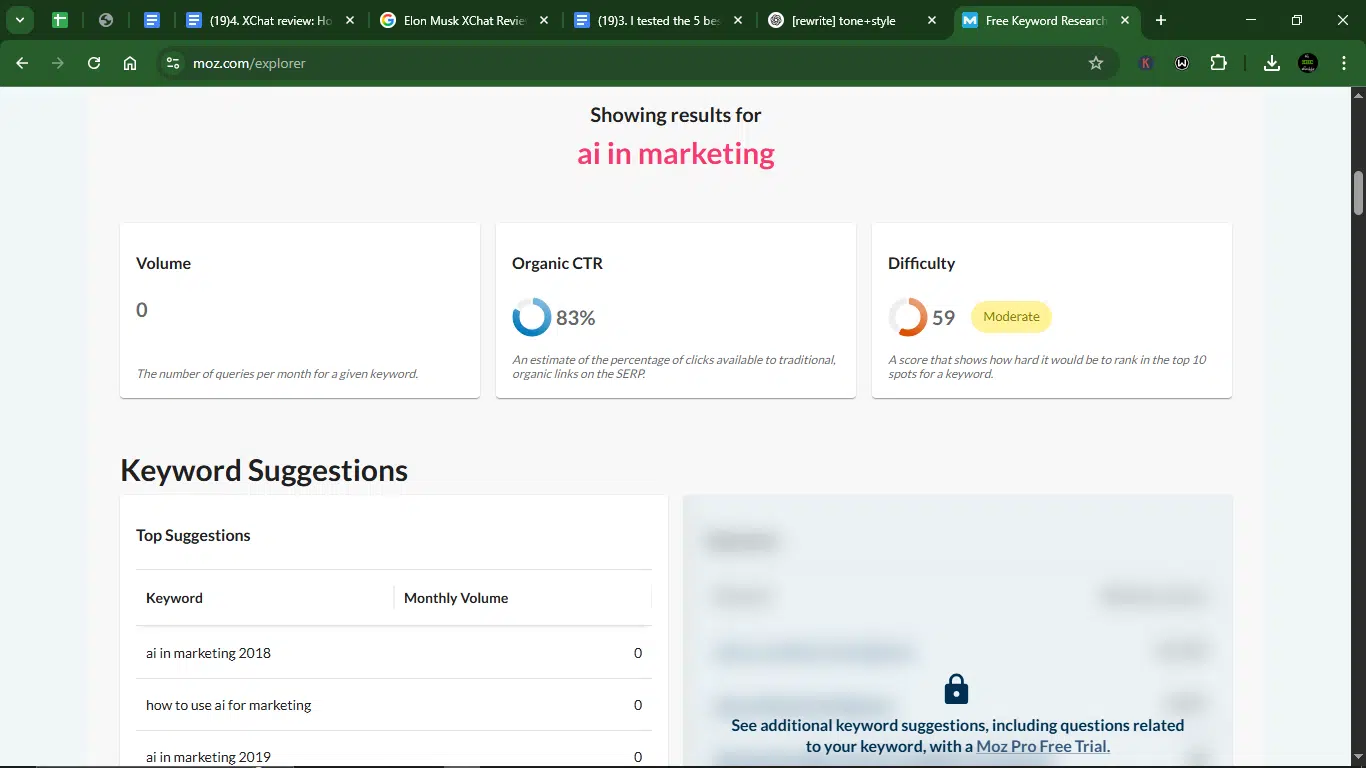
Key features:
- Priority score: A unique metric that quickly tells you what’s worth pursuing.
- Difficulty & Organic CTR metrics: Go beyond volume to gauge winnability.
- SERP analysis previews: See top-ranking pages and featured snippets.
- Keyword suggestions: These are based on topics, not just variants.
- Integrates with Moz Pro: Unlocks site audits, rank tracking, and backlink tools.
- User-friendly UI: Even if it’s not flashy, it’s clear and well-organized. I had no issues navigating the tool.
Pricing:
The free option allows 10 keyword queries per month with signup, or a full 30-day free trial of Moz Pro (no card needed).
| Plan | Monthly cost | Annual cost | Target users | Key features |
| Starter | $49 | $468 | Beginners or solo founders | 1 user 1 tracked site50 tracked keywords/month20,000 pages crawled/monthMoz AI-powered toolsKeyword suggestions by topic Starter SEO tools: keyword research, competitive research, MozBar Premium, site tracking- 24-hour online support |
| Standard | $99 | $948 | Small teams needing a full keyword toolkit | 1 user 3 tracked sites300 tracked keywords/month400,000 pages crawled/monthMoz AI-powered toolsKeyword suggestions by topicStandard SEO tools: keyword research, backlink analysis, competitive research, unlimited reports, MozBar Premium, site tracking- 24-hour online support |
| Medium | $179 | $1,716 | Growing businesses or consultants | 2 users 10 tracked sites 1,500 tracked keywords/month2 million pages crawled/monthMoz AI-powered toolsKeyword suggestions by topicAll Standard tools plus branded reports, report templates, and increased quotas on SEO tools |
| Large | $299/mo | $2,868 | Agencies with large portfolios | 3 users included25 tracked sites 3,000 tracked keywords/month5 million pages crawled/monthMoz AI-powered toolsKeyword suggestions by topicAll Medium features plus expanded quotas across SEO tools |
What I liked about Moz Keyword Explorer:
- That Priority score is gold when you’re juggling dozens of keyword options.
- SERP previews help avoid wasting time on no-click or heavily branded terms.
- It has a super digestible layout, which is great if you’re overwhelmed by too many numbers.
- Syncs well with Moz’s broader tools like rank tracking and site audits.
- Keyword data feels curated, not bloated.
What I didn’t like about Moz Keyword Explorer:
- The free plan is limited, and you burn through queries fast.
- UI feels a bit old. This isn’t a dealbreaker, but not slick either.
- Lacks modern features like real-time question clustering or AI suggestions.
- Doesn’t natively pull in PAA or Google Trends data.
- The search limits and high pricing can feel restrictive compared to competitors.
- Slightly smaller keyword database compared to Ahrefs or Semrush.
5. Semrush Keyword Magic Tool
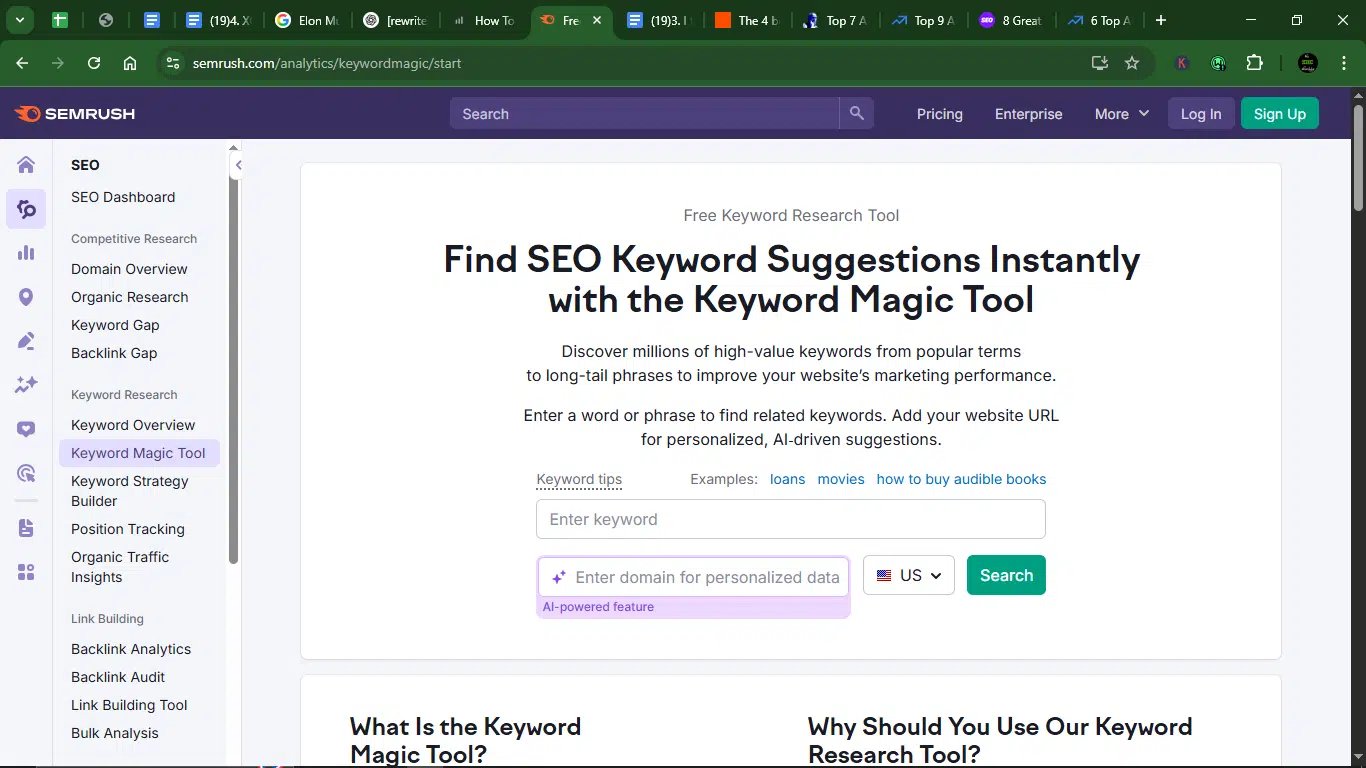
Semrush’s Keyword Magic Tool is what you turn to when you’re ready to level up from “just getting traffic” to getting the right traffic. Unlike basic keyword generators, this tool dives into an over 25 billion keyword database and blends it with AI-powered filters, intent detection, and competitive metrics to surface the terms that move the needle.
This tool doesn’t just ask, “What are people searching for?” It asks, “What should you be ranking for, and how hard will it be?”
If you’re a content strategist, SEO lead, or part of an in-house team looking to outsmart the competition, this one’s a beast. It’s powerful, precise, and deeply integrated with the broader Semrush ecosystem.
| Developer | Semrush Inc. |
| Year launched | 2016 (Keyword Magic Tool), Semrush was founded in 2008 |
| Type of SEO tool | Keyword research & SERP data |
| Top 3 use cases | Long-tail keyword discovery, competitive analysis, SEO strategy |
| Who can use it | Agencies, in-house SEO teams, and content marketers |
| AI capabilities | AI-generated keyword grouping and intent tagging |
| Starting price | $129.95/month (Pro plan) |
| Free plan or trial? | Free account with limited daily queries |
How the Semrush Keyword Magic Tool works:
- Enter a seed keyword. Start with a general term related to your business. If you’re a beauty business owner, “sustainable skincare” is an example of a seed keyword.
- Review the keyword suggestions. The tool pulls thousands of related queries, which you can filter by match type (broad, exact, phrase, related), and sort by search intent, CPC, difficulty, or SERP features. You can also see the 12-month trend lines and competitive density.
- Analyze keyword metrics. Use the provided metrics to decide which keywords to include in your SEO strategy.
- Export keywords to lists. Organize by topic clusters, or sync with Semrush’s content planner and tracker. It’s especially handy when researching long-tail terms or figuring out what gaps your competitors haven’t covered yet.
- Use the keywords. Incorporate selected keywords into your SEO strategy. Use the keywords you chose in the previous step in your content, meta tags, and anchor text.
Key features:
- Keyword search volume: Discover the average number of monthly searches for any keyword, pulled from a vast database of 25 billion keywords across multiple countries and languages.
- Search intent detection: Understand what users are looking for. Each keyword is tagged with search intent labels (informational, transactional, navigational, commercial) and SERP feature icons (e.g., featured snippets, ads, video results) to help you align content with user goals.
- 12-month search trend: View the keyword’s popularity trend over the last year. Spot seasonal patterns or emerging topics before your competitors.
- Cost-per-click (CPC): See the average advertising cost per click for each keyword, which helps gauge commercial value and profitability for paid campaigns.
- SERP features overview: Identify which special features (e.g., People Also Ask, image packs, local packs) are present in search results, so you can tailor your content for visibility.
- Competitive density: Measure how competitive a keyword is among advertisers. Higher density means more people are bidding on it, which signals a valuable keyword.
- Advanced match type filters: Use broad match, exact match, phrase match, or related keywords to narrow your research and find highly targeted keyword opportunities.
- AI-powered keyword clustering: Instantly group keywords into smart topic clusters based on intent, semantic similarity, or common terms, perfect for creating content hubs or SEO silos.
- Full suite integration: Seamlessly connect your keyword research with the rest of the Semrush ecosystem to run site audits, track rankings, analyze backlinks, and plan content in one place.
Pricing:
| Plan | Target users | Monthly price | Annual price (billed monthly) | Key features |
| Pro | Beginners & individual projects | $139.95 | $117.33 | Up to 5 projectsKeyword research toolsCompetitor analysis toolsPosition TrackingBacklink AnalysisSite Audit |
| Guru | Small businesses | $249.95 | $208.33 | Everything in ProUp to 15 projectsHistorical dataMulti-location & device data ChatGPT Search trackingContent marketing tools |
| Business | Agencies & mid-market companies | $499.95 | $416.66 | Everything in Guru Up to 40 projectsShare of VoiceExtended limitsAPI accessMigration from third-party tools |
What I liked about the Semrush Keyword Magic Tool:
- One of the largest keyword databases I’ve ever worked with.
- Intent tagging takes the guesswork out of keyword sorting.
- Exports and integrations make it easy to scale campaigns.
- Especially useful for long-tail research and topic cluster building.
- 12-month trend insights help avoid chasing short-term hype.
- The free plan is surprisingly generous.
What I didn’t like about the Semrush Keyword Magic Tool:
- It’s pricey, which makes it not ideal if you’re a freelancer or solo creator.
- It can be overwhelming at first, as it has too many columns and filters.
- The AI grouping isn’t always perfect. Sometimes, you’ll still need to clean up clusters manually.
- The full experience requires jumping into the broader Semrush suite.
- Intent and feature tags occasionally misclassify niche queries.
6. Ubersuggest
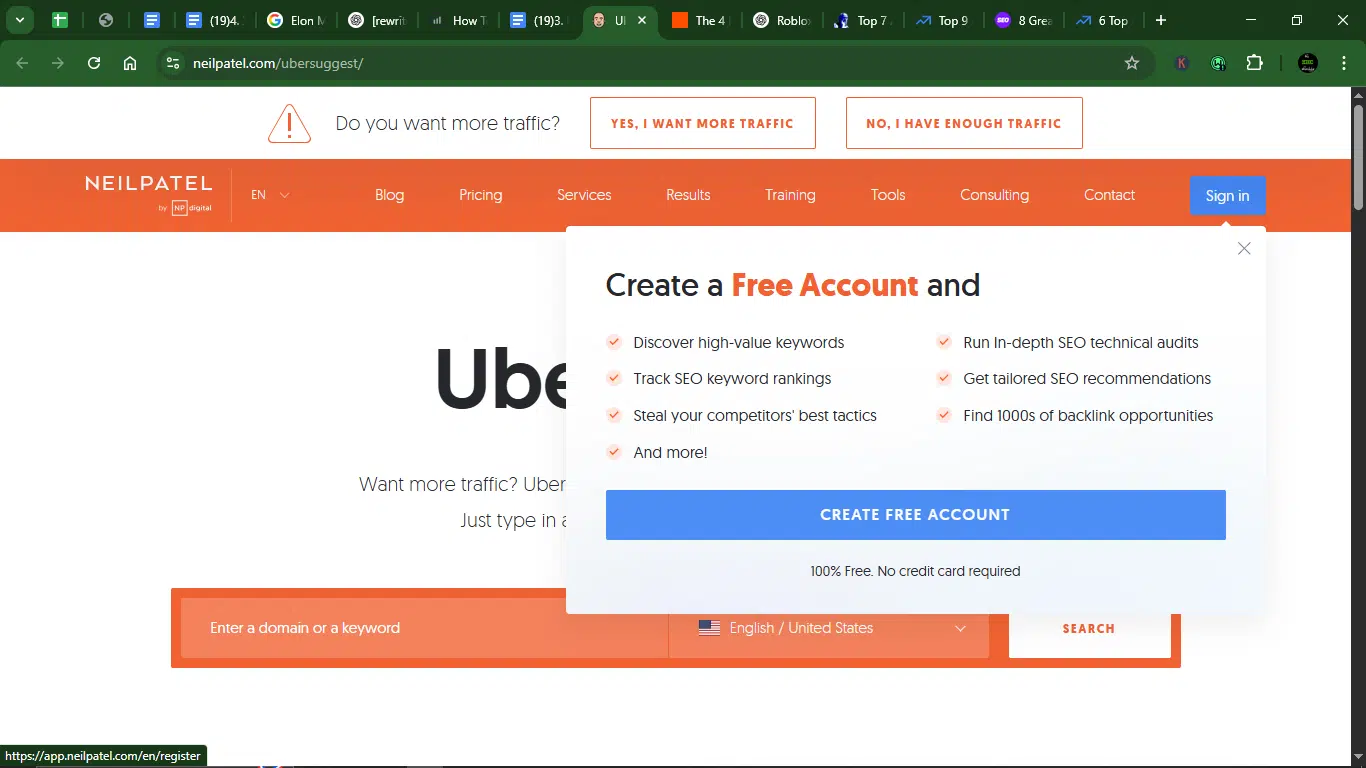
Ubersuggest is the keyword tool I wish I had when I was just getting started. Built by Neil Patel and revamped from a tool that scraped Google Suggest terms, Ubersuggest is essentially SEO for the rest of us: freelancers, bloggers, solo creators, and small business owners who need solid keyword and content data, without coughing up enterprise-level fees.
While it can’t outmuscle Semrush or Ahrefs in raw depth, it more than makes up for it with simplicity, visual clarity, and one of the best value-for-money deals out there.
| Developer | NP Digital (Neil Patel) |
| Year launched | 2017 (it was acquired and revamped) |
| Type of SEO tool | Keyword research & site analysis |
| Top 3 use cases | Long-tail keyword ideas, basic site audits, and content planning |
| Who can use it | Solo creators, bloggers, and small business owners |
| AI capabilities | AI content idea generator, brief suggestions |
| Starting price | $29/month (or $290 lifetime for individual tier) |
| Free plan or trial? | Yes — 3 daily searches with limited data |
| Trustpilot rating | 4.3/5 |
How Ubersuggest works:
You enter a keyword or a competitor’s URL, and Ubersuggest returns keyword suggestions, complete with search volume, difficulty, CPC, and basic SEO audit data, which it categorizes by related terms, questions, prepositions, and comparisons.
It also adds a “Top SEO Pages” report showing which content performs best in your niche, light backlink data to identify link-worthy content, and AI-driven content ideas based on high-performing posts in your niche.
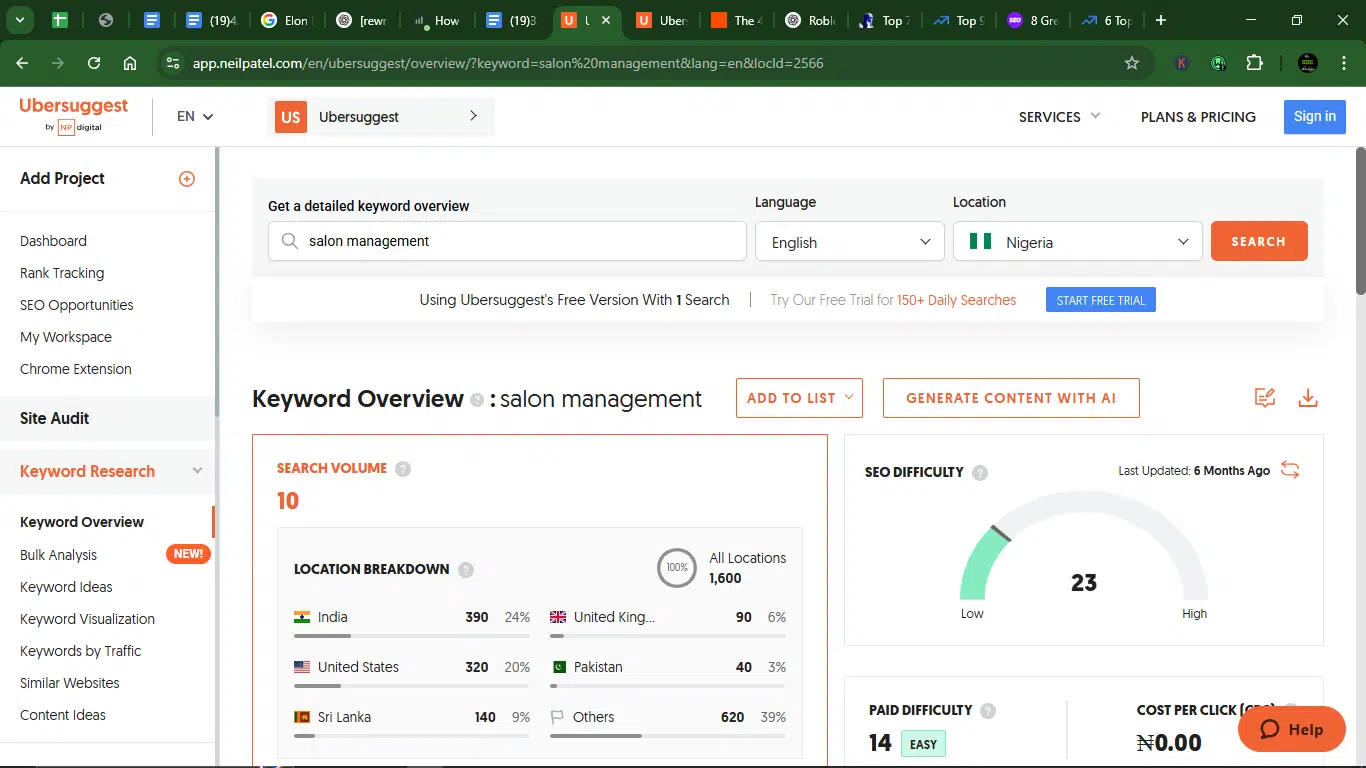
Key features:
- Keyword suggestions via Google autosuggest: Instantly generate keyword ideas based on real-time Google Autocomplete data. Discover trending search terms, long-tail keywords, and user-driven variations.
- Core keyword metrics: View key performance indicators for each keyword, including search volume (average monthly searches), CPC, and SEO difficulty score to estimate how hard it’ll be to rank organically.
- Intent-focused filters: Easily sort keyword ideas by search intent, including questions (e.g., “how,” “what,” “why”), comparisons (e.g., “vs,” “best,” “alternative”), and prepositions and other phrase structures that indicate what users want.
- Content ideas tool: Discover high-performing blog posts and pages based on the keyword, with insights into social shares (Facebook, Pinterest, etc.) and backlink counts. Use it to reverse-engineer content that drives both visibility and engagement.
- Site audit tool: Get a page-level breakdown of your site’s SEO health. Identify and fix issues like broken links, missing meta tags, slow-loading pages, or duplicate content.
- Top pages report: Find your competitors’ best-performing content. See which URLs get the most traffic, links, and social traction—then create something better.
- Basic backlink analyzer: See who’s linking to your site (or your competitors’) and spot opportunities to replicate strong backlink strategies.
- Rank tracking & domain overview: Monitor how your site and keywords rank over time. Compare multiple domains to benchmark your performance against competitors.
- Export options: Download keyword data, content reports, or audit results in CSV, PDF, or image format for easy sharing or reporting.
- AI writing assistance: Get starter ideas with AI-powered content briefs, great for creators looking to beat writer’s block and structure posts faster.
Pricing:
The free plan includes 3 keyword searches per day with limited features.
| Plan | Ideal users | Monthly price | Lifetime price | Key features |
| Individual | Solopreneurs, small businesses with one website | $12 | $ 120 | 1 user.1 domain.150 searches/day. 5 competitors/domain. 1,000 page scans/domain. 125 tracked keywords/domain.Export images, CSV & PDF |
| Business | Businesses with multiple websites | $20 | $ 200 | 2 users7 domains300 searches/day.10 competitors/domain.5,000 page scans/domain. 150 tracked keywords/domain.Unlimited locations/domains.Export images, CSV & PDF. |
| Enterprise | Multinationals or large corporations | $ 40 | $ 400 | 15 domains- 900 searches/day.15 competitors/domain. 10,000 page scans/domain.300 tracked keywords/domain.Unlimited locations/domains. Export images, CSV & PDF. |
What I liked about Ubersuggest:
- Clean UI that’s unintimidating for SEO beginners.
- Lifetime pricing is ridiculously affordable for solo creators.
- AI content suggestions are great for writer’s block.
- Top-performing content & backlink insights simplify strategy.
- Visualizations make it easy to explain SEO to clients.
- Good for basic audits, especially quick on-page wins.
What I didn’t like about Ubersuggest:
- Not ideal if you need deep SERP analysis or advanced segmentation.
- Data sometimes feels dated or overly generic.
- Keyword difficulty scoring isn’t always consistent.
- Limited clustering or advanced filtering options.
- Export functions are minimal compared to competitors.
- Heavy upselling in the free version can feel spammy.
- Limited to 3 keyword searches per day.
Feature comparison table
| Tool | Best for | Clustering | Export | Free tier? | Data source |
| Google Keyword Planner | PPC, local SEO, raw volume data | None | CSV Export | Yes (with Google Ads) | Google Ads |
| Ahrefs Keywords Explorer | Competitive analysis, deep SEO | Keyword groups | CSV Export | No | Google, YouTube, Bing, Amazon |
| AlsoAsked | Visual question mapping, FAQs | Tree-style PAA | PNG/CSV Export | Yes, limited keyword searches | Google People Also Ask |
| Moz Keyword Explorer | Beginners, content validation | Suggestions | CSV Export | Yes, 3 keyword searches per day | Google + clickstream |
| Semrush Keyword Magic | Enterprise SEO, topic clusters | Broad match sets | CSV Export | No | Google, YouTube, forums |
| Ubersuggest | Solo creators, budget SEO | Suggestions | CSV Export | Yes, 3 keyword searches per day | Google Autosuggest |
Why keyword tools like AnswerThePublic are essential
If you write for the internet, you already know the quiet war going on behind the scenes. Every blog post, product description, or landing page is battling hundreds of others for a single Google click. It’s not just about writing anymore. Now, it’s about understanding what people really want to know.
That’s where tools like AnswerThePublic and its many alternatives come in.
These tools do more than just spit out keywords. They map curiosity. They help us decode how people think, what they search for at 2 am, and how those questions change with trends, seasons, or global chaos. As a content marketer, I’ve seen these tools turn vague blog ideas into full content calendars, backed by real user intent.
Here’s why they matter across the board:
1. For writers and creators
Whether crafting newsletters, writing SEO blogs, or scripting YouTube videos, keyword discovery tools show you the exact language people use. It bridges the gap between what you want to say and what your audience is looking for.
2. For content marketers
These tools help pinpoint pain points, pre-sale questions, and decision-stage queries. Instead of guessing, you build content that hits every stage of the funnel, with proof that people are searching for it.
3. For agencies and SEO professionals
You can’t walk into a client meeting with hunches. These tools provide the data backbone for strategy decks, content briefs, and performance reviews. As a bonus, the stunning visuals from tools like AlsoAsked or AnswerThePublic look fantastic in presentations.
4. For product teams and founders
You can track how people describe problems your product solves. That means better feature naming, landing page copy, and product roadmap ideas, all based on user language and search trends.
5. For paid media and PPC strategists
Even if you’re buying clicks instead of chasing organic ones, knowing what people are typing into Google helps refine targeting and ad copy that converts.
In summary, these tools are more than just SEO playthings. They’re modern-day listening posts, eavesdropping on the internet to help you create things that resonate.
The challenges of using tools like AnswerThePublic
As much as these tools have become second nature in my content workflow, I’ve learned (sometimes the hard way) that they’re not without friction points.
1. Too much data, not enough direction
Some tools hand you hundreds of keyword suggestions in one go, but without any context or prioritization. I’ve stared at a wall of “AI in healthcare” queries before, wondering which ones mattered. Without filtering or clustering, it’s easy to feel like you’re swimming in noise instead of insight.
That said, some tools, including the Moz Keyword Explorer, which I’ve highlighted in this article, have the prioritization feature.
2. Google isn’t always honest or fresh
Most tools rely heavily on Google’s Autosuggest and People Also Ask. But Google doesn’t always surface the latest trends or what real people are asking in niche communities like Reddit or Quora. If the data pipeline is stale or too generic, your content risks being behind the curve before it even gets published.
3. Paywalls everywhere
This one stings. You find a tool that looks promising, run one search, and bam, they are asking you to upgrade to Pro to see results. Some tools tease value but hide core features behind expensive paywalls. And for solo creators or small teams, that monthly spend adds up fast.
4. Keyword doesn’t equal intent
Just because a tool shows a keyword doesn’t mean it tells you why someone’s searching it. Understanding the user’s actual problem, not just the phrase, is where many keyword tools fall short. That’s where experience (and sometimes AI-enhanced tools like Moz) help bridge the gap.
5. UX overload
Ironically, the more powerful a tool is, the steeper the learning curve tends to be. I’ve used platforms like Ahrefs or Semrush that offer fantastic data, but navigating the UI can feel like piloting a spaceship (I’ve seen enough alien movies to know it’s difficult). If you’re not used to SEO dashboards, it’s easy to get overwhelmed.
6. Limited local or niche data
If you’re targeting audiences in Africa, Southeast Asia, or even a specific U.S. city, good luck getting accurate long-tail data from most global SEO tools. Localization is still mostly hit or miss.
These tools are super useful, but they are just that, tools. They’re not crystal balls. They won’t write the perfect headline or magically uncover hidden user intent. But with the right expectations and strategy, they can help you get 80% of the way there. As for the rest, that’s where your creativity, empathy, and experience take over.
5 tips for using keyword tools without getting overwhelmed
After testing all these tools and running countless searches for clients and my content, I’ve picked up a few hard-earned tips to make keyword tools work for you, instead of leading you into a rabbit hole of confusion.
1. Always start with a real question
Don’t just open the tool and type in a broad keyword like “AI” or “finance.” Start with a real content goal or user question in mind. For example: “How is AI used in African hospitals?” Tools work best when they’re helping you explore or validate something specific, not when you’re aimlessly fishing.
2. Focus on intent, not just volume
It’s tempting to chase high-volume keywords. But if you’re writing to rank and convert, user intent matters just as much, if not more. A lower-volume keyword like “how AI detects pneumonia in children” might drive more relevant traffic than a vague one like “AI in healthcare.”
3. Use clustering tools to spot content themes
Instead of targeting single keywords one at a time, look for keyword clusters or parent topics. This helps you structure smarter content hubs and increase topical authority. Tools like Semrush and AlsoAsked do this pretty well.
4. Export and organize your data
Don’t let insights die in the tool’s dashboard. Export keyword lists, organize them by topic or funnel stage, and add notes. This saves time when you’re outlining or delegating content later. This also helps justify the strategy to clients, editors, or stakeholders.
5. Mix tools for a complete picture
No one tool does it all. Some are better for long-tail questions, others for competitive research or SERP data. For example, you can combine Moz (for volume + competition) and AlsoAsked (for branching intent). You’ll find your sweet spot.
Pro tip: Tools are just starting points. The magic happens when you combine data with empathy and creativity. That’s how you stop writing for search engines and start writing for real people searching.
Conclusion
After spending time with all these tools, I realized something that changed how I approach keyword research: The best tool isn’t always the biggest name. It’s the one that quietly fits how you think, plan, and write.
If you’re a visual thinker, one tool will click. If you need robust export features for an agency workflow, another one steps up. That’s the beauty of testing: it turns guesswork into clarity.
Personally, I’ve found myself coming back to two tools again and again. But your stack might look different, and that’s okay.
FAQs about AnswerThePublic alternatives
What is the best free alternative to AnswerThePublic?
If we’re talking free with no aggressive upsells, AlsoAsked and Google Keyword Planner, People are solid picks. You won’t get flashy dashboards, but you will get fresh, visual question clusters pulled directly from real user behavior.
Which tools use Google Autosuggest like AnswerThePublic?
Quite a few. Ubersuggest and Semrush Keyword Magic Tool all tap into Google Autosuggest data (and in some cases, YouTube, Amazon, and Bing too). Just keep an eye on how often they update and how transparent they are about data freshness.
Are there tools better than AnswerThePublic for SEO?
Yes, especially if you want deeper data or content strategy features. Frase wins for AI-powered briefs, Semrush for competitive keyword research, and Ahrefs or Moz for backlink and intent data. AnswerThePublic is still useful, but it’s no longer the full package.
What’s the most affordable AnswerThePublic alternative?
Ubersuggest probably takes that crown. It offers generous features on a budget-friendly plan, and you can get lifetime access if you prefer a one-time payment. It’s not the most advanced, but for solo creators, it delivers serious bang for your buck.
Can I export keyword data with these tools?
Most of them, yes. But it varies by plan. Semrush, Ahrefs, and Moz offer robust export options. Free plans from tools like AlsoAsked and Ubersuggest sometimes limit this, so double-check before committing.
Which tool gives the best long-tail keyword clusters?
Semrush Keyword Magic Tool stands out here. It breaks down long-tails with filters, intent, and SERP features that make clustering easier for bigger campaigns.
Is AnswerThePublic still worth it in 2025?
It depends on your workflow. If you love quick visual maps for content brainstorming or client decks, it’s still great. But if you need deeper insights, fresher data, or AI content support, other tools are starting to outpace it.
Disclaimer!
This publication, review, or article (“Content”) is based on our independent evaluation and is subjective, reflecting our opinions, which may differ from others’ perspectives or experiences. We do not guarantee the accuracy or completeness of the Content and disclaim responsibility for any errors or omissions it may contain.
The information provided is not investment advice and should not be treated as such, as products or services may change after publication. By engaging with our Content, you acknowledge its subjective nature and agree not to hold us liable for any losses or damages arising from your reliance on the information provided.
Always conduct your research and consult professionals where necessary.



